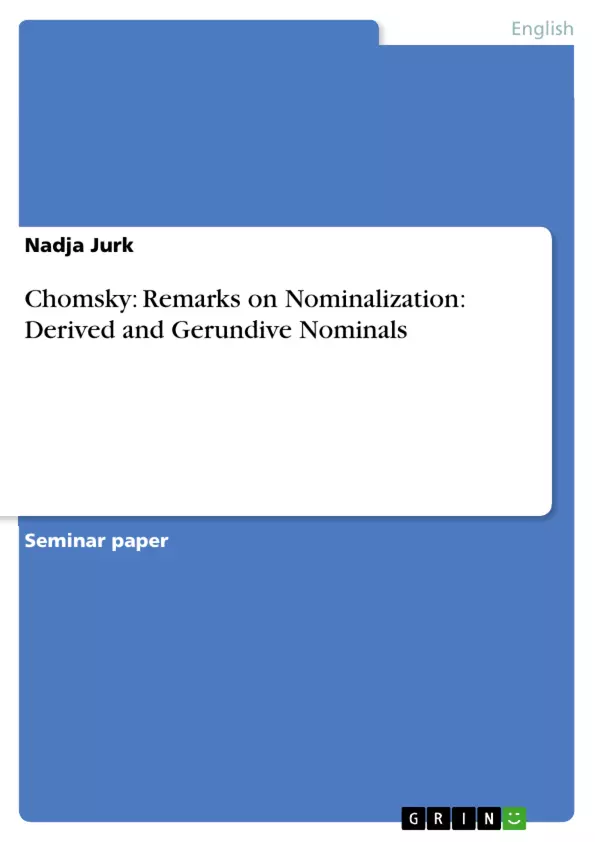1. Introduction
The American linguist and philosopher Noam Chomsky is seen as one of the most important developers of language theories. He has composed and published many literary works that have been dispersed worldwide. He has worked to further the study and understanding of linguistics from both the biological and psychological perspective.
This termpaper mainly refers to Chomsky′s essay "Remarks on Nominalization" , published in 1970. In this essay he discusses the major structural differences between "gerunds" ( verbal nouns like in "John being easy to please", or "John interesting the children with his stories") and "derived nominals" (regular nouns like in "the destruction of the city").
"Among various types of nominal expressions in English there are two of particular importance, each roughly of propositional form...the gerundive nominals...and the derived nominals..."
In my termpaper I am going to comment exactly on those two linguistic phenomenons: gerundive nominals vs. derived nominals. In order to comprehend Chomsky′s analysis I will have to provide some general assumptions about syntax, the lexicon and the approaches Chomsky uses in his article.
[...]
Inhaltsverzeichnis (Table of Contents)
- Introduction
- Syntax vs. Lexicon
- Lexicon
- Verbs
- Nouns
- The Definition Of Syntax
- Surface vs. Deep Structure
- Lexicalist vs. Transformationalist Position
- Lexicalist Approach On Derived Nominals
- Lexicalist Approach On Gerundive Nominals
- Nominalization
- Derived Nominals
- Complements
- The Most Important Differences Between Gerunds And Derived Nominals
- Conclusion
Zielsetzung und Themenschwerpunkte (Objectives and Key Themes)
This term paper analyzes Noam Chomsky's essay "Remarks on Nominalization" (1970), focusing on the structural differences between gerunds and derived nominals. It examines the interaction of syntax and the lexicon, the lexicalist vs. transformationalist positions, and the specific features of each nominal type.
- The interaction of syntax and the lexicon
- The lexicalist vs. transformationalist positions
- The structural properties of gerunds and derived nominals
- The role of complements in nominalization
- The importance of Chomsky's work in linguistics
Zusammenfassung der Kapitel (Chapter Summaries)
- Introduction: This chapter introduces Noam Chomsky's "Remarks on Nominalization" and outlines the key focus of the term paper: the structural differences between gerunds and derived nominals.
- Syntax vs. Lexicon: Chomsky explains the relationship between syntax and the lexicon, highlighting how they interact and influence each other. He defines the lexicon as a system of features that helps us categorize words into four universal categories: nouns, verbs, adjectives, and prepositions.
- Surface vs. Deep Structure: This section explores the distinction between surface and deep structure in language. It examines how the underlying structure of a sentence can differ from its actual surface form, and how this applies to the analysis of nominalizations.
- Lexicalist vs. Transformationalist Position: This chapter discusses two different approaches to grammatical analysis: the lexicalist approach, which emphasizes the role of the lexicon, and the transformationalist approach, which focuses on rules of sentence transformation.
- Lexicalist Approach On Derived Nominals: This chapter explains how the lexicalist approach analyzes the formation of derived nominals, emphasizing the role of lexical rules in creating these noun-like structures.
- Lexicalist Approach On Gerundive Nominals: This chapter examines the lexicalist perspective on the formation of gerundive nominals, highlighting the unique characteristics of these verbal nouns.
- Nominalization: This section discusses the concept of nominalization itself, exploring the process of transforming verbs into noun-like structures.
- Derived Nominals: This chapter delves deeper into the analysis of derived nominals, focusing on their structural properties and the role of complements in their formation.
Schlüsselwörter (Keywords)
The key concepts and terms explored in this paper include syntax, lexicon, gerunds, derived nominals, nominalization, lexicalist vs. transformationalist approaches, complements, and Chomsky's theoretical framework for understanding language.
- Quote paper
- Nadja Jurk (Author), 2001, Chomsky: Remarks on Nominalization: Derived and Gerundive Nominals, Munich, GRIN Verlag, https://www.hausarbeiten.de/document/4808


